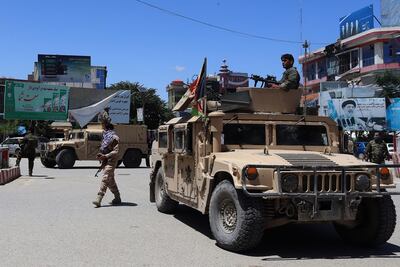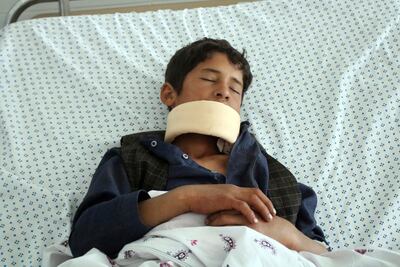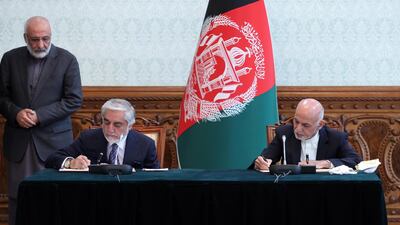The formation of Afghanistan’s latest coalition government may have ended months of political uncertainty, but it is unlikely to provide a speedy remedy for all of the country's challenges. First and foremost, it is essential that the leaders of the country’s new coalition set aside the deep personal animosity that has dominated the political scene since last September’s presidential election contest.
As with Afghanistan’s previous presidential election in 2014, the 2019 ballot was marred by claims of corruption and increasingly bitter exchanges between President Ashraf Ghani and his main rival and erstwhile coalition partner, Abdullah Abdullah, who served as the country’s chief executive in the previous administration.
Dr Abdullah, in particular, resorted on several occasions during the campaign to indulging in personal insults against Mr Ghani, denouncing him as a remote, self-centred leader who had deceived and disappointed the public, even describing him as an “ant without wings.”

The deep antipathy that has existed between the two men and their supporters since then is one reason it has taken eight months for them to resolve their differences and agree to form a new coalition.
For the feud did not end with the election, the results of which were not announced until February. Although the electoral commission concluded that Mr Ghani had won, Dr Abdullah dismissed its conclusion as fraudulent, and declared himself the winner. This led to the ludicrous spectacle whereby, on March 9, the two politicians each conducted their own inauguration ceremonies, held just metres apart in Kabul, in which, in effect, they sought to establish rival governments.
Thankfully, the high farce that has characterised Afghan politics in recent months is now at an end after the two leaders finally agreed to resolve their differences and sign a political agreement under which they will share power equally. Under the terms of the agreement, which was signed last Sunday, Mr Ghani will continue to serve as President while Dr Abdullah is appointed Chairman of the National Reconciliation High Council, with both leaders agreeing to appoint equal numbers of cabinet ministers.
The failure of the two men to resolve their differences earlier has been a source of immense frustration both for the Afghan people and the wider world beyond, especially the US, which has been immersed in peace negotiations with the Taliban to end the civil war while the Afghan government has been reduced to a state of limbo by the constant political in-fighting.
Thus, while Washington is clearly pleased that Afghanistan now has a new government, US Secretary of State Mike Pompeo, who announced an intention to cut $1 billion in aid to Kabul in protest at the two-governments fiasco, nevertheless could not resist chiding the Afghan leaders for taking so long to resolve their differences. A terse statement issued by the State Department remarks: “Secretary Pompeo noted that he regretted the time lost during the political impasse.”

While Mr Ghani, commenting on the formation of the new government, said its goals were “to ensure a path to peace, improve governance, protect rights, respect laws and values”, it is clear, certainly from Washington’s perspective, that its first priority must be to revive peace negotiations between the Taliban and the Afghan government.
A first round of talks, which were due to take place on March 10, were delayed by the ongoing political standoff between Mr Ghani and Dr Abdullah. The meeting had been arranged after the US and the Taliban signed their historic deal on February 29, whereby the US agreed to withdraw its remaining forces from Afghanistan in return for the Taliban helping to reduce violence in the country and ensure that Islamist terror groups, such as Al Qaeda and ISIS, would no longer be offered sanctuary.
There have been promising signs from the Taliban that the militant group is serious about upholding its end of the deal. A letter issued by Haibatullah Akhundzada, the leader of the Taliban, to mark the end of Ramadan reiterated that the militants are "committed to the agreement [with the US]...and urges the other side to honour its own commitments and not allow this critical opportunity to waste”.
Yet serious questions do remain following a significant upsurge in terrorist activity since it was signed, with Afghan government officials reporting that more than 3,800 attacks have been carried out since early March.
These include last week’s horrific attack on a maternity ward in Kabul, in which 24 people, including mothers, babies and nurses, were killed, which the Afghan government has blamed on the Taliban.
In spite of the ferociousness of the attacks, the US continues to insist that the Taliban are sticking to their end of the bargain because they have observed their commitment not to attack US-led coalition forces.
But this distinction will bring little comfort to the Afghan people, who continue to suffer at the hands of the Taliban and other extreme Islamist groups, such as ISIS.
As Dr Anwar Gargash, the UAE Minister of State for Foreign Affairs, commented on Twitter following the formation of the new Afghan coalition, “abhorrent violence targeting the helpless in Afghanistan must be strongly opposed”, adding that “a political process cannot succeed until there is an end to the terror engulfing the country”.
Whether the recent upsurge in violence can be brought to an end now depends on the ability of the new Afghan government to engage in peace talks with the Taliban, a process that Kabul has previously resisted on the grounds that it does not negotiate with terrorists. But with the Taliban buoyed by its deal with Washington and now a major force in Afghan politics, the new government may find it has no alternative but to reach a deal with its bitter foe.
Con Coughlin is the Telegraph’s defence and foreign affairs editor


